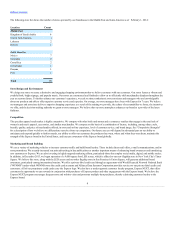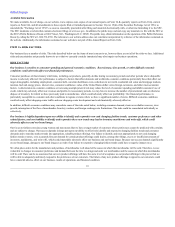Express 2013 Annual Report Download - page 15
Download and view the complete annual report
Please find page 15 of the 2013 Express annual report below. You can navigate through the pages in the report by either clicking on the pages listed below, or by using the keyword search tool below to find specific information within the annual report.
Table of Contents
outlay, which could adversely affect our ability to continue opening new stores. To the extent we open new stores in markets where we have existing stores, our
existing stores in those markets may experience reduced net sales.
Additionally, we plan to expand our business internationally through franchise agreements, joint ventures, and company-owned and operated stores in select
markets, and these plans could be negatively impacted by a variety of factors. We may be unable to find acceptable partners with whom we can enter into
agreements, negotiate acceptable terms for these agreements, and gain acceptance from consumers outside of the United States. Franchise agreements also create
the inherent risk as to whether such third parties are able to both effectively operate the businesses and appropriately project our brand image in their respective
markets. Ineffective or inappropriate operation of the franchise businesses or projection of our brand image could create difficulties in the execution of our
international expansion plan.
Our domestic growth and international expansion plans will place increased demands on our financial, operational, managerial, and administrative resources.
These increased demands may cause us to operate our business less efficiently, which in turn could cause deterioration in the performance of our existing
stores. Furthermore, relating to our international expansion, our ability to conduct business in international markets may be affected by legal, regulatory,
political, and economic risks, including our unfamiliarity with local business and legal environments in other areas of the world. Our international expansion
strategy and success could also be adversely impacted by the global economy, as well as by fluctuations in the value of the dollar against foreign currencies.
Our planned growth will also require additional infrastructure for the development, maintenance, and monitoring of new stores and our e-commerce business.
In addition, if our current management systems and information systems are insufficient to support this expansion, our ability to open new stores and to
manage our existing stores, e-commerce business, and franchise arrangements would be adversely affected. If we fail to continue to improve our infrastructure,
we may be unable to implement our growth strategy or maintain current levels of operating performance in our existing stores.
We are subject to risks associated with leasing substantial amounts of space, including future increases in occupancy costs.
We lease all of our store locations, our corporate offices and our central distribution facility. We typically occupy our stores under operating leases with terms
of ten years, with options to renew for additional multi-year periods thereafter. In the future, we may not be able to negotiate favorable lease terms. Our inability
to do so may cause our occupancy costs to be higher in future years or may force us to close stores in desirable locations.
Some of our leases have early cancellation clauses, which permit the lease to be terminated by us or the landlord if certain sales levels are not met in specific
periods or if the center does not meet specified occupancy standards. In addition to future minimum lease payments, some of our store leases provide for
additional rental payments based on a percentage of net sales, or “percentage rent,” if sales at the respective stores exceed specified levels, as well as the
payment of common area maintenance charges, real property insurance, and real estate taxes. Many of our lease agreements have defined escalating rent
provisions over the initial term and any extensions. As we expand our store base, our lease expense and our cash outlays for rent under the lease terms will
increase.
We depend on cash flow from operations to pay our lease expenses. If our business does not generate sufficient cash flow from operating activities to fund these
expenses, due to continued decreases in mall traffic or other factors, we may not be able to service our lease expenses, which could materially harm our
business.
If an existing or future store is not profitable, and we decide to close it, we may nonetheless be committed to perform our obligations under the applicable lease
including, among other things, paying the base rent for the balance of the lease term. Moreover, even if a lease has an early cancellation clause, we may not
satisfy the contractual requirements for early cancellation under that lease. Our inability to enter into new leases or renew existing leases on terms acceptable to
us or be released from our obligations under leases for stores that we close could materially adversely affect us.
We rely on third parties to provide us with certain key services for our business. If any of these third parties fails to perform their obligations to us
or declines to provide services to us in the future, we may suffer a disruption to our business. Furthermore, we may be unable to provide these
services or implement substitute arrangements on a timely and cost-effective basis on terms favorable to us.
We rely on many different third parties to provide us with certain key services. For example, we rely on a third party to operate our central distribution facility
in Columbus, Ohio and to provide certain inbound and outbound transportation and delivery services, distribution services, customs, and brokerage
services. We also rely on another third party to provide us with logistics and other services related to our e-commerce operations. In connection with our
sourcing activities, we rely on approximately 60 buying agents and vendors to help us source products from approximately 345 manufacturing facilities, and
in connection with our marketing activities, we rely on third parties to administer our customer database, our loyalty program, and our gift
15
























